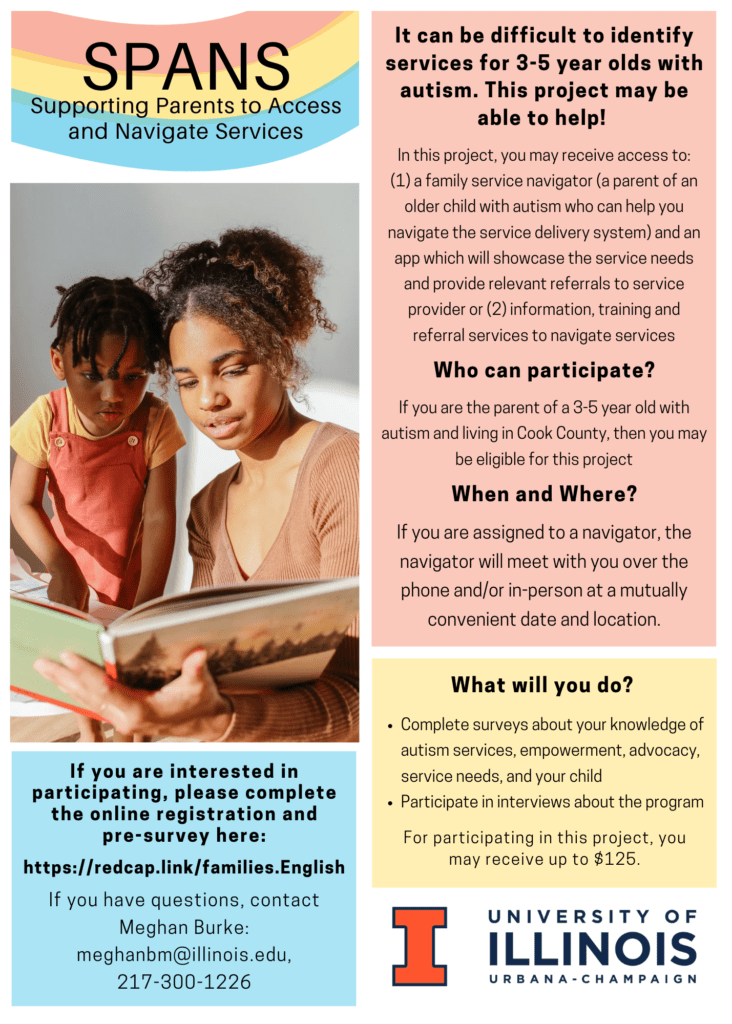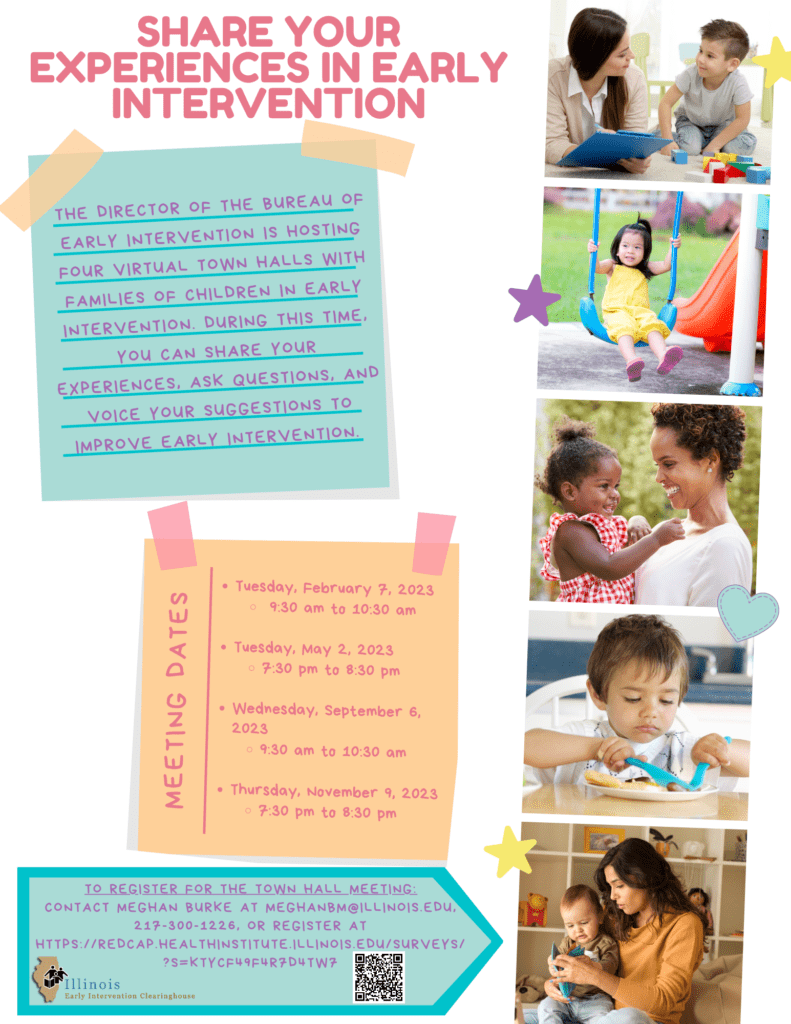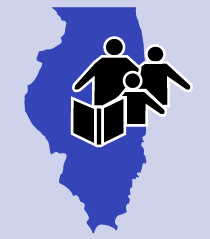For early intervention to be effective, it needs to be individualized around the needs and routines of your family. To do this, it is important that you share your lifestyle, culture, and preferences with early intervention professionals.
I wish that other families knew more about early intervention because it’s so important, it’s worth it… it makes our days easier.
– Jessica
Video Spotlight: Family Stories
“Illinois EI Experiences” Video Series

Often, it can be helpful to learn from others who have similar experiences. Given the family-centered focus of early intervention, it may be especially helpful to learn about the experiences of other families of children in early intervention. Do they have similar experiences to your experience? How has early intervention benefited their family? Is there an activity that worked for their child that could work for your child? By learning from other families, you may be able to answer these questions.
With funding from the Illinois State Board of Education and the Illinois Department of Human Services, we developed short videos with families about their early intervention experiences. In the videos, the family may answer some of the following questions:
- What do you wish families knew about early intervention?
- How would you describe an early intervention session?
- How do you incorporate early intervention strategies across your daily routines?
- How do you partner with early intervention professionals?
- What was your experience when your child transitioned from EI to school services?
- What was the most helpful strategy you learned from early intervention?
- What was the best experience you had in early intervention?
- Why did you enroll in early intervention?
We know you are busy. These videos are short (less than 2 minutes) to allow you to squeeze in viewing time during your hectic schedules.
The videos showcase families with varying experiences in early intervention. The videos also present families from all regions of Illinois and with children with varying support needs. The videos reflect families in a variety of languages including: English, Spanish, Chinese, French, Arabic, and Urdu. Feel free to peruse any of the videos that may resonate with you!
Enter our Giveaway!
Enter to win!
Spending time together while reading aloud helps to create strong parent-child bonds and promotes healthy brain development. Complete the entry form below for a chance to win a read aloud prize package!
All entries received by 3/31/2023 will receive a gift in the mail.
Winner can choose preferred language for books.

Recommended Books and Resources
Everyday Early Intervention: Sharing your family’s lifestyle and culture
For early intervention to be effective, it needs to be individualized around the needs and routines of your family. To do this, it is important that you share your lifestyle, culture, and preferences with early intervention professionals. By sharing information, early intervention professionals are better equipped to help draft meaningful individualized family service plan (IFSP) goals and identify strategies that can be embedded in your family routines to meet your goals.
Consider your day-to-day life. Think about activities that work well for your child. What seems to work well? Why does it work well? Now, consider the activities that are hard for your child. Why may the activity be hard? You may share these hard activities with your early intervention professional to brainstorm together strategies to address challenges. Below, we provide some examples.
| Activity | Information about you and your family | What you could share with your Early Intervention provider(s) |
|---|---|---|
| A picture of a big extended family | Your child does well at home when with your immediately family members. However, when you think about holidays or special gatherings, your child gets overwhelmed. | You may want to share with your early intervention professional that, while your immediate family is small, your extended family is large. You like to celebrate holidays together; the gatherings are often loud. You need strategies to help address your child’s discomfort. |
| A picture of your car | You often chauffeur your older children to and from school and sports throughout the day. Your young child spends a lot of time in the car. | You share with your early intervention professional that your child spends a lot of time in the car because of your older children’s schedules. You need some ways to incorporate early intervention strategies while driving (e.g., singing songs in the car, mapping language onto things the child may see outside the window). |
| Language Preferences | Your family speaks a mix of English and Spanish at home. When the grandparents or extended family are present, you often speak in Spanish. Your child understands English and Spanish but struggles to expressively communicate in either language. | You may share with the early intervention professional the dual languages used in your home. The professional may suggest that the picture communication symbols and other language aids that are used with your child be offered in English and Spanish. |
| Birthdays | Aligned with your family’s religion, you don’t celebrate birthdays. However, as your child’s third birthday approaches, the early intervention professionals want to mark the occasion. | You can share your religious beliefs with your professionals. Together, you can brainstorm other ways to mark the milestone of your child aging out of early intervention without focusing on the 3rd birthday. |
Need an iPad or a Hotspot for Live Video Visits?
Many families are receiving Early Intervention services through live video visits. To help families with technology needs, the Early Intervention Clearinghouse has added several technology devices to the lending library:
- iPads with a cellular data plan (device and Internet access)
- iPads without a cellular data plan (device)
- Hotspot with cellular data plan (Internet access)
To request a device, please complete our Device Loan Request Form (also available in Spanish). For more information about live video visits, see our tip sheet Introduction to Early Intervention (EI) Live Video Visits: Frequently Asked Questions (also available in Spanish).

The State Systemic Improvement Plan (SSIP) Update
We are beginning our scale up efforts! For the last several years, we have been implementing our SSIP strategies in three pilot sites. We have now collected enough data to feel confident that the strategies we are implementing are ready to be expanded. In the coming year, we will begin implementation with five new Child and Family Connections offices. Scale up work began recently with a webinar to introduce the work. Next, we will hold recruitment opportunities for Leadership Teams, collect some information from team members, and host kickoff events for each new site. The Leadership Teams will then do some planning and begin receiving training and support from our system partners.
In addition to the scale up, the original sites continue to support the providers in their areas with ongoing professional development. We also continue to meet with our large stakeholder group to ensure that we are implementing a plan aligned with their vision for our system. Our next SSIP report is due to the Office of Special Education Programs (OSEP) by February 1st.
As always, if you have any comments or questions about the Plan, please email them to Chelsea Guillen at cguillen@illinois.edu.
Research Opportunities
Supporting Parents to Access and Navigate Services

With the Family Resource Center on Disabilities, we are looking for families of 3-5 year olds with autism living in Cook County. Families participating in our project may receive a family navigator to help the family access services for their autistic child. Families will be compensated for their participation. If interested, please complete the online registration and pre-survey at https://redcap.link/families.English If you have questions, please contact Meghan Burke at meghanbm@illinois.edu or 217-300-1226.
Upcoming Events
Early Intervention Town Halls (Virtual)

The Director of the Bureau of Early Intervention is hosting four virtual town halls with families of children in early intervention. During this time, you can share your experiences, ask questions, and voice your suggestions to improve early intervention.
Meeting Dates:
Tuesday, February 7, 2023
9:30 am to 10:30 am
Tuesday, May 2, 2023
7:30 pm to 8:30 pm
Wednesday, September 6, 2023
9:30 am to 10:30 am
Thursday, November 9, 2023
7:30 pm to 8:30 pm
To register for the town hall meeting, contact Meghan Burke at meghanbm@illinois.edu OR 217-300-1226 OR https://redcap.healthinstitute.illinois.edu/surveys/?s=KTYCF49F4R7D4TW7

